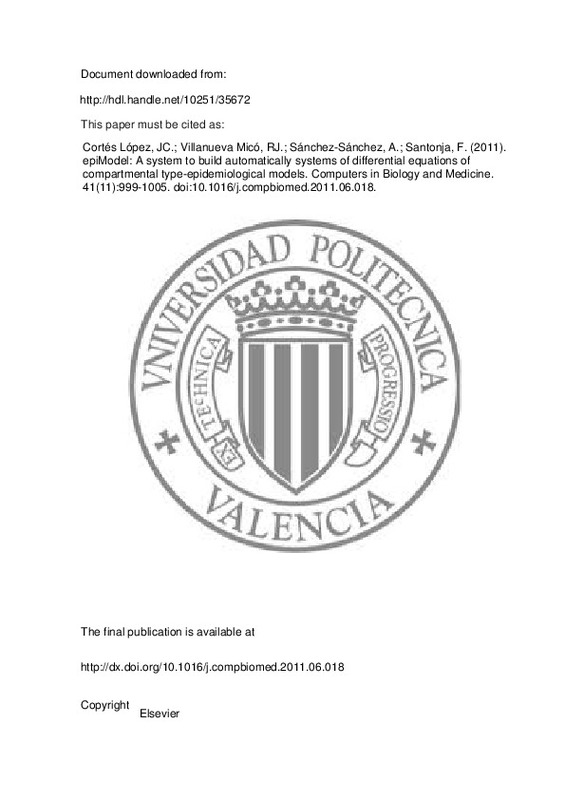JavaScript is disabled for your browser. Some features of this site may not work without it.
Buscar en RiuNet
Listar
Mi cuenta
Estadísticas
Ayuda RiuNet
Admin. UPV
Including business strategy in model-driven methods: an experiment
Mostrar el registro sencillo del ítem
Ficheros en el ítem
| dc.contributor.author | Noel-Lopez, Rene
|
es_ES |
| dc.contributor.author | Panach, Jose Ignacio
|
es_ES |
| dc.contributor.author | Pastor López, Oscar
|
es_ES |
| dc.date.accessioned | 2024-05-28T18:17:33Z | |
| dc.date.available | 2024-05-28T18:17:33Z | |
| dc.date.issued | 2023-09 | es_ES |
| dc.identifier.issn | 0947-3602 | es_ES |
| dc.identifier.uri | http://hdl.handle.net/10251/204462 | |
| dc.description.abstract | [EN] Software-centric organisations design a loosely coupled organisation structure around strategic objectives, replicating this design to their business processes and information systems. Nowadays, dealing with business strategy in a model-driven development context is a challenge since key concepts such as the organisation's structure and strategic ends and means have been mostly addressed at the enterprise architecture level for the strategic alignment of the whole organisation, and have not been included into MDD methods as a requirements source. To overcome this issue, researchers have designed the LiteStrat, a business strategy modelling method compliant with MDD for developing information systems. This article presents an empirical comparison of LiteStrat and with i*, one of the most used models for strategic alignment in an MDD context. The article contributes with a literature review on the experimental comparison of modelling languages, the design of a study for measuring and comparing the semantic quality of modelling languages, and empirical evidence of the LiteStrat and i* differences. The evaluation consists of a 2 x 2 factorial experiment recruiting 28 undergraduate subjects. Significant differences favouring LiteStrat were found for models' accuracy and completeness, while no differences in modeller's efficiency and satisfaction were detected. These results yield evidence of the suitability of LiteStrat for business strategy modelling in a model-driven context. | es_ES |
| dc.description.sponsorship | This work has the financial support of the Spanish State Research Agency and the Generalitat Valenciana under the projects PID2021-123824OB-I00 and PDC2021-121243-I00 funded by MICIN/AEI/10.13039/501100011033, INNEST/2021/57 and GENI (CIAICO/2022/229), co-financed with ERDF and the European Union NextGenerationEU/PRTR, and the National Agency for Research and Development (ANID)/Scholarship Program/ Doctorado Becas Chile/2020-72210494. | es_ES |
| dc.language | Inglés | es_ES |
| dc.publisher | Springer-Verlag | es_ES |
| dc.relation.ispartof | Requirements Engineering | es_ES |
| dc.rights | Reconocimiento (by) | es_ES |
| dc.subject | Organisational modelling | es_ES |
| dc.subject | Goal modelling | es_ES |
| dc.subject | Model-driven architecture | es_ES |
| dc.subject | Business strategy modelling | es_ES |
| dc.subject | Organisational structure modelling | es_ES |
| dc.subject.classification | LENGUAJES Y SISTEMAS INFORMATICOS | es_ES |
| dc.title | Including business strategy in model-driven methods: an experiment | es_ES |
| dc.type | Artículo | es_ES |
| dc.identifier.doi | 10.1007/s00766-023-00400-3 | es_ES |
| dc.relation.projectID | info:eu-repo/grantAgreement/AEI/Plan Estatal de Investigación Científica y Técnica y de Innovación 2017-2020/PDC2021-121243-I00/ES/PLATAFORMA DELFOS: SISTEMA DE INFORMACION PARA LA GESTION DE VARIACIONES GENOMICAS/ | es_ES |
| dc.relation.projectID | info:eu-repo/grantAgreement/AEI/Plan Estatal de Investigación Científica y Técnica y de Innovación 2021-2023/PID2021-123824OB-I00/ES/DESARROLLO AGIL DE SISTEMAS DESDE REQUISITOS A CODIGO/ | es_ES |
| dc.relation.projectID | info:eu-repo/grantAgreement/AGENCIA VALENCIANA DE LA INNOVACION//INNEST%2F2021%2F57//SISTEMA INTELIGENTE DE APOYO A LA TOMA DE DECISIONES CLÍNICAS EN MEDICINA DE PRECISIÓN/ | es_ES |
| dc.relation.projectID | info:eu-repo/grantAgreement/ANID//2020-72210494/ | es_ES |
| dc.rights.accessRights | Abierto | es_ES |
| dc.contributor.affiliation | Universitat Politècnica de València. Escola Tècnica Superior d'Enginyeria Informàtica | es_ES |
| dc.description.bibliographicCitation | Noel-Lopez, R.; Panach, JI.; Pastor López, O. (2023). Including business strategy in model-driven methods: an experiment. Requirements Engineering. 28(3):411-440. https://doi.org/10.1007/s00766-023-00400-3 | es_ES |
| dc.description.accrualMethod | S | es_ES |
| dc.relation.publisherversion | https://doi.org/10.1007/s00766-023-00400-3 | es_ES |
| dc.description.upvformatpinicio | 411 | es_ES |
| dc.description.upvformatpfin | 440 | es_ES |
| dc.type.version | info:eu-repo/semantics/publishedVersion | es_ES |
| dc.description.volume | 28 | es_ES |
| dc.description.issue | 3 | es_ES |
| dc.identifier.pmid | 37359152 | es_ES |
| dc.identifier.pmcid | PMC9999337 | es_ES |
| dc.relation.pasarela | S\501318 | es_ES |
| dc.contributor.funder | European Commission | es_ES |
| dc.contributor.funder | AGENCIA ESTATAL DE INVESTIGACION | es_ES |
| dc.contributor.funder | European Regional Development Fund | es_ES |
| dc.contributor.funder | AGENCIA VALENCIANA DE LA INNOVACION | es_ES |
| dc.contributor.funder | Universitat Politècnica de València | es_ES |
| dc.contributor.funder | Agencia Nacional de Investigación y Desarrollo de Chile | es_ES |










